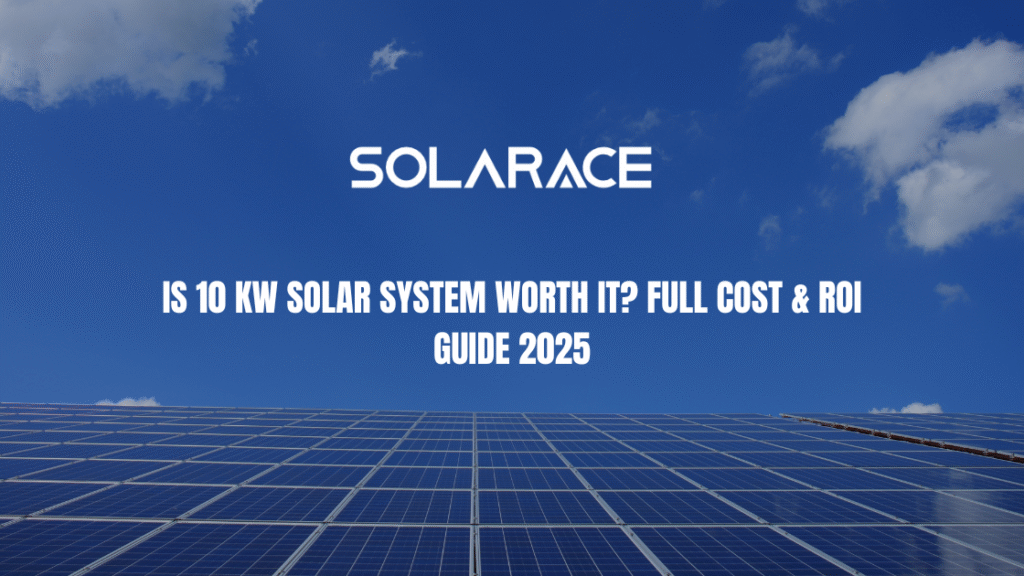Introduction: Is a 10 kW Solar System Right for You?
If you’re running a large household, a home with multiple appliances, or a small commercial space, you’ve probably already asked yourself: “Is a 10 kW solar system worth it?”
Spoiler: Yes, in 2025, the 10 kW solar panel price in India has become more affordable, and the returns more impressive.
In this blog, we’ll cover pricing, savings, government subsidies, ROI, and performance insights to help you decide whether a 10 kW solar system is a smart investment.
Table of Contents
Who Needs a 10 kW Solar System?
A 10 kW solar system typically generates 35–45 units of electricity per day, depending on location and sunlight exposure. It’s ideal for:
- Large homes with ACs, water heaters, and multiple appliances
- Villas and duplexes
- Clinics, restaurants, and showrooms
- Schools and coaching centers
- Small commercial establishments with 3-phase connections
What is the 10 kW Solar Panel Price in India (2025)?
Here’s a breakdown of estimated pricing in India:
| Type of Installation | 10 kW Solar Panel Price (INR) |
|---|---|
| Standard Rooftop (On-grid) | ₹6,00,000 – ₹7,50,000 |
| Hybrid System (with Battery) | ₹8,50,000 – ₹10,50,000 |
| Premium TopCon Panels | ₹7,50,000 – ₹9,00,000 |
Note: Pricing may vary based on brand, inverter type, panel efficiency, and installation complexity.
Free Solar Quotes
Government Subsidy for 10 kW Systems in 2025
Residential users can still avail central government subsidies under the Rooftop Solar Programme Phase II.
| System Capacity | Subsidy Amount (INR) |
|---|---|
| Up to 3 kW | ₹18,000 per kW |
| 3–10 kW | ₹9,000 per kW (for 3–10 kW portion) |
| Above 10 kW | Fixed subsidy of ₹1,17,000 |
To apply, installations must be completed through MNRE-registered vendors like Solar Ace Energy.
What’s the ROI on a 10 kW System?
Let’s say your average bill is ₹12,000/month. With solar, you could cut this by up to ₹9,000–₹10,000/month.
- Annual savings: ₹1,00,000 – ₹1,20,000
- Payback period: 5–6 years
- System life: 25+ years
- ROI: 400%+ over the lifespan
Even better—commercial entities can claim accelerated depreciation benefits for faster financial returns.
On-Grid vs. Hybrid vs. Off-Grid – Which to Choose?
| Type | Battery Backup | Ideal For |
|---|---|---|
| On-Grid | ❌ No | Urban homes & grid-connected units |
| Off-Grid | ✅ Yes | Rural areas with no grid access |
| Hybrid | ✅ Yes | Businesses needing backup + savings |
Installation Timeline & Process
- Site Survey & Load Analysis
- Proposal with 10 kW Solar Panel Price & ROI
- Subsidy Application & DISCOM Approval
- Installation & Net Metering Setup
- System Handover + AMC Plan Activation
Environmental Impact
Installing a 10 kW system offsets 10–12 tons of CO₂ annually, equal to planting over 400 trees. That’s how powerful solar can be.
FAQs – 10 kW Solar Solar System
Q1: How much area is needed for 10 kW solar?
Approx. 700–800 sq. ft. of shadow-free rooftop space.
Q2: Can I use this for a 3-phase commercial meter?
Yes, 10 kW is commonly used for 3-phase connections.
Q3: What is included in the price?
Solar panels, inverter, mounting structures, net meter, cables, and installation.
Q4: Do I need Solar batteries?
Only for off-grid or hybrid systems. On-grid doesn’t require storage.
Q5: Can I track system performance?
Yes, most inverters come with mobile app monitoring features.
Final Verdict: Is It Worth It?
A 10 kW solar system in 2025 is not just an eco-conscious decision, it’s a financially sound one. With falling costs, rising savings, and robust government support, the 10 kW solar panel price in India is now a smart investment for both homes and small commercial setups.
📞 Ready to switch to solar? Call Solar Ace at 9586722221
📧 Email: info@solaraceenergy.com
🌐 Visit: solaraceenergy.com


